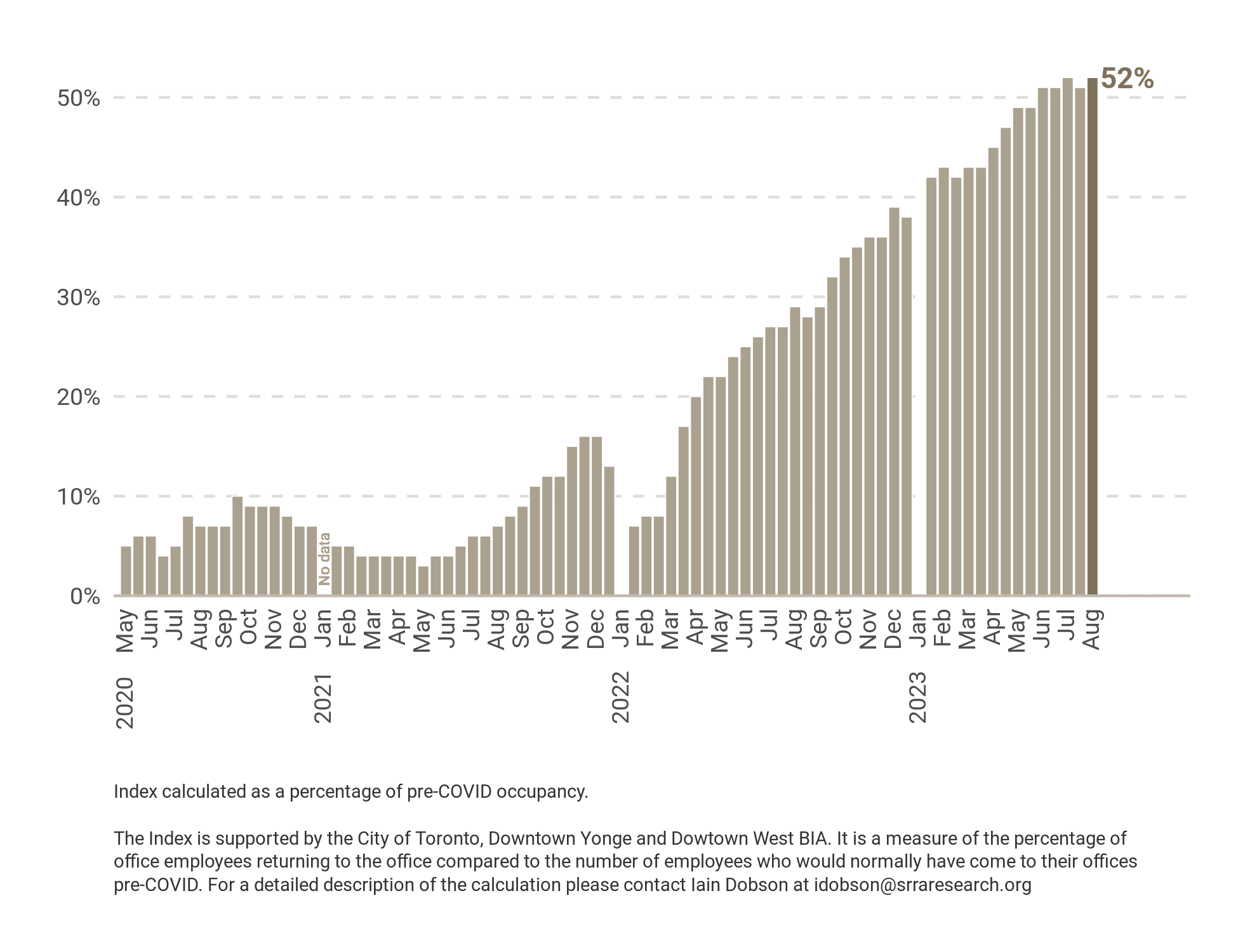Average weekly - 52%
Peak Day - Wednesday 67%
Slow Day - Monday 28%
July continued to be a slow month in the office.
However, there have been signs in the early part of August of potentially higher in-office numbers in September.
See the articles of Interest for some eye-opening research on the impact of remote work.
Otherwise, not unexpectedly, no material change this summer.
The next Index is scheduled for week of Sept 11th, 2023.
Best wishes from the SRRA team.
Links to Articles of Interest
Why the Office Works – A Neuroscientist’s Perspective
This is a must read for anyone seeking to grasp the complexities surrounding the frustrating and often conflicting opinions colouring the current debate about working from home vs being in an office environment. Neuroscientist Professor Ellard conducts research on the connection between human psychology and built environments both real and virtual. He starts his analysis by pointing out that “it has only been in the past three years that we have become obsessed with the most serious question: What is an office for?” His answers – no, this is not a binary question – debunk the views expressed by some of his colleagues. “One systematic review after another will tell you that people seem happier and more balanced with working from home (WFH) and that, if anything, productivity is enhanced. Don’t believe it.” He goes on to suggest that “the evidence shows that most studies purporting to demonstrate the advantages of WFH have simply asked employees how they feel about their level of productivity, rather than measure it directly. Studies that use more finely tuned quantitative measures tend to show that those of us working from home spend more hours working (including the time that we “save” by not having to commute) but are generally a bit less productive than those resident in workplaces.” Recounting a recent visit to a Suisse office campus where no expense has been spared to create an attractive environment, he notes that “Part of our reluctance to return to the office must surely have come about because so many of our working spaces fail us. If you build it and they don’t come, you’ve built it wrong.” His conclusion? “Lacklustre buildings make us want to stay home…..There’s no substitute for actually being there.”
Less Than Objective Opinion Piece by a Self-Described “Office Whisperer”
Although it is common practice for publications to caution that views expressed in “commentary pieces are solely the views of their authors and do not necessarily reflect the opinions the publication, this admonition is stretched to the limit. The author is a consultant who focuses on the benefits of hybrid work. His first sentence sets the tone: “Full-time in-office work is going the way of the dinosaurs.” Proof “that the relentless, five-days-a-week grind in the office is the worst option for knowledge-work schedules” is attributed to meta-analysis carried out by a researcher at Stanford University who is “the top academic expert on flexible work models.”
What Happened to the Weekend?
Not talking about the Canadian singer here. This article relates the work of the same researcher cited above, but focuses on a potential downside of working from home – which is that people who slack off during the week have to use their weekends to catch up.
Stanford Research Paper Finds That WFH Reduces Productivity by 10%
This article also cites Stanford research but doesn’t identify the author, finding that electronic devices like Slack are no substitute for in-person communications. While advocates for a return to the office may be heartened by these findings, when debates about WFH perpetuate extreme positions (all good, vs all bad) this dichotomy will surely cause people who truly want to understand what is going on to tune out.
Meta Reversal on Remote Work Could Undermine Employee Trust Cautions Harvard Advisor
Perhaps because Meta (back when it was known as Facebook) embraced remote work so confidently, a recent decision by Mark Zuckerberg to revert to strictly enforced hybrid conditions has been heavily criticized. The latest coming from a Harvard-based leadership advisor, who finds that requiring full-time employees to display badges that indicate their location at all times to be overkill, and potentially harmful to morale.
Lyft CEO Also Pushes Formerly Remote-Working Staffers to Return to the Office
Not unlike the mandarins in Ottawa who reduced the amount of office space early on during the pandemic, Lyft is now having to find ways to accommodate staffers who had previously been working at home after having cut space by half.
Then On the Other Hand…
Pret a Manger has said that it is committed to work from home. ‘It’s here to stay’ says the boss.
Or this from Goldman Sachs…Five Days in the Office is Expected
Financial giants like Goldman Sachs however are dispensing with any suggestion that hybrid is an option…
But You Can Count on Forbes to Run Counter Trend
Buried in this account of workers moving further out than ever from their office locations (attributable to the WSJ) is a plea for boosting activity in office clusters for the sake of preserving the vitality of downtowns. “If people aren't heading to the office five days a week, what's going to happen to our urban cores?” The predicted impact will be felt by B and C class office buildings, Forbes suggests.
Philadelphia BID Criticizes the Efficacy of Kastle’s Office Occupancy Barometer
Highly misleading the BID director concludes. A tally of less than 40% occupancy for the City of Brotherly Love’s business district is based on card swipes at only two buildings, the BID complains.
“The Occupancy Index is supported by the City of Toronto, Downtown Yonge BIA, and Downtown West BIA. It is a measure of the percentage of office employees returning to the office compared to the number of employees who would normally have come to their offices pre-COVID. For a detailed description of the calculation please contact Iain Dobson at [email protected],”

